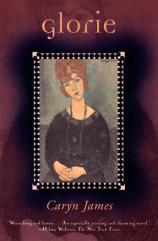Reading Group Guide
Discussion Questions
Glorie

1. The book begins with a story Glorie heard throughout her childhood and often told Jack. The man on the boat coming to America asks her mother, "Where did you get that little red-haired girl?" The story ends with her mother saying, "You'll rise over everybody, Gloria. You'll better us all." Why is that dream so important to Glorie? Does she fulfill her mother's prophecy? How important is her family's immigrant background in shaping Glorie's life, her character, her aspirations?
2. What does Glorie gain and lose by devoting her life so completely to Jack? Does that choice have any relevance to women today who struggle to balance families and careers? Was she better or worse off than women are now? Throughout the novel Glorie struggles to preserve her independence. How independent was she when she was married to Jack? How independent is she as a widow?
3.Glorie says of her daughter, "Wonderful Louisa had turned out just like her father. She was smart, she was funny, she could blow up at someone who treated her wrong and be their best friend the next day" (p. 26). Do you see ways in which she is like her father? Are there ways in which she is like Glorie?
4. How would you describe Glorie and Louisa's mother-daughter relationship? Why do they argue? When Blanche tells Louisa, "You always say she was awful when you were growing up, she gave all her attention to Grandpa and none to you" (p.114), Louisa denies this. Do you think there is some truth in what Blanche says, or is she distorting things, as Louisa says? Was Glorie a good mother to Louisa?
5. What do you think of Jack? How accurate are Glorie's memories of him? Do her imaginary conversations with Jack help her cope or distance her from reality? How firm is Glorie's grip on reality? Does that change as the novel goes along?
6. Glorie thinks her son-in-law, Patrick, is so boring she calls him "Ivory Soap" and so stupid she makes fun of him as "the Italian Patrick." Do you agree? What do other characters—Louisa, his children and his aunts—think of Patrick? Is he the book's villain?
7. Who are the people Glorie truly loves? Why does she find it difficult to express her affection for them? Who are the people she detests? Does she have the same problem expressing her feelings for them?
8. Throughout the novel Glorie recalls dreams and stories. Among them are the story Jack used to tell the grandchildren about the rooster who went to fight with the king, and a dream Glorie has in the hospital in which she has flowing white hair "wild as a troll's" (p. 219). What other stories and dreams does she recall? What role do these fairy-tale elements have in the novel? What do they reveal about Glorie's thoughts?
9. Glorie has rich memories of her sexual life with Jack and misses their physical relationship. Does that seem surprising in the depiction of a woman in her eighties? What stereotypes do we have about old people, and how does Glorie fit into or defy those images?
10. Why does Glorie finally sell her house? How much of that decision was really about money? Did it have anything to do with Glorie getting caught in the blizzard? Or was it just a matter of time?
11. Glorie compares the Aunts to circus performers. ("Elephants, trapeze artists and performing old people," she tells Jack on page 116) and sees them as "three organ grinder's monkeys lined up across the table" (pp. 123-4) on Christmas Eve. Why is she so hard on them? Do they have distinct personalities? Do you think Glorie should have moved into their apartment building? Why does she almost see Stella as a confidante? When she tells Jack at the end of the book, "They're kind, aren't they?" has she come to her senses or is she being, as she suspects, "delirious" (p. 226)?
12.When Ada teaches Glorie to do the Evil Eye, does she really believe that curse will force the new owner out of her house? How clever are the practical jokes she plays on him? What might these tricks be signs of: her desperation? her boredom? her state of mind?
13. At the end of the book, when Glorie is in the hospital, she tells her great-grandchildren, Jeremy and Lily, "Honeys, I don't want you to be afraid" (p. 228). What does she mean? At the very end, when she sees Jack "hiding up in the sky, like Jack on top of the beanstalk," and says, "I'm coming, Jack," what does that suggest? Do you think they're together in the afterlife, or is this another of Glorie's fantasies? Is it a happy ending for her? For you?
Glorie
- Publication Date: August 1, 1999
- Paperback: 256 pages
- Publisher: Penguin (Non-Classics)
- ISBN-10: 0140281541
- ISBN-13: 9780140281545






